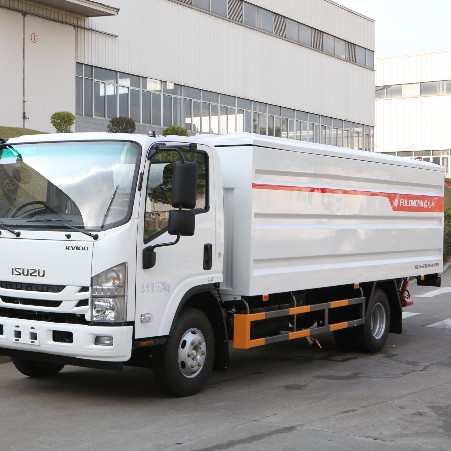The term “smart city” refers to an urban area that uses advanced technology and data analytics to enhance the quality of life for its residents. By integrating information and communication technology (ICT) with various physical devices connected to the Internet of Things (IoT), smart cities aim to optimize the efficiency of city operations and services. Waste management is a critical component of this vision, and waste bin trucks are at the forefront of this transformation.
Historically, waste bin trucks have been the backbone of urban waste management. These vehicles are responsible for collecting waste from residential, commercial, and industrial areas and transporting it to designated disposal or recycling facilities. The efficiency and reliability of waste bin trucks directly impact the cleanliness and health of a city. Traditional waste bin trucks, however, face challenges such as inefficient routes, high fuel consumption, and limited capacity for data collection. These issues underscore the need for innovation and modernization.

What is a Smart City?
A smart city is an urban area that utilizes digital technology and data to improve the quality of life for its residents, enhance operational efficiency, and promote sustainability. Key features of a smart city include:
- Connectivity: Seamless communication networks connecting various devices and systems.
- Data Analytics: Collection and analysis of data to inform decision-making and optimize services.
- Sustainability: Efforts to reduce environmental impact through green technologies and practices.
- Citizen Engagement: Platforms for residents to interact with city services and provide feedback.
- Automation: Use of automated systems to streamline operations and reduce human error.
Smart cities aim to create an interconnected urban environment where technology and data drive improvements in infrastructure, transportation, energy management, and waste management.
Integration of Waste Bin Trucks in Smart Cities
In smart cities, waste bin trucks are no longer just vehicles for transporting waste. They are equipped with advanced technologies that enhance their functionality and efficiency. Here’s how:
- GPS Tracking: Allows for real-time monitoring of waste bin trucks, optimizing routes, and reducing fuel consumption.
- IoT Sensors: Installed waste bins to monitor fill levels, ensuring timely collection and preventing overflow.
- Data Analytics: Collects data on waste generation patterns, helping city planners improve waste management strategies.
- Automation: Automated waste bin trucks reduce the need for manual labor, increasing efficiency and safety.
These integrations make waste bin trucks an essential component of smart city infrastructure, enabling cities to manage waste more effectively and sustainably.
Innovations Driving
Several innovations are driving the partnership between waste bin trucks and smart cities:
- Smart Waste Bins: Equipped with sensors that detect fill levels and communicate with waste bin trucks for optimized collection schedules.
- Electric Waste Bin Trucks: Reduce carbon emissions and fuel costs, contributing to greener cities.
- Robotic Arms and Automation: Increase the efficiency and safety of waste collection.
- Data-Driven Decision Making: Using data from waste bin trucks to inform urban planning and resource allocation.
These innovations not only improve waste management but also contribute to the broader goals of smart cities, such as sustainability, efficiency, and improved quality of life.
Conclusion
The partnership between waste bin trucks and smart cities represents a significant step forward in urban waste management. By integrating advanced technologies, waste bin trucks are becoming more efficient, environmentally friendly, and capable of meeting the demands of modern urban living. This synergy not only improves waste management but also contributes to the broader goals of smart cities, such as sustainability, efficiency, and enhanced quality of life. As cities continue to grow and evolve, the role of waste bin trucks in smart cities will become increasingly important, driving innovation and improving urban living conditions.
FAQs
1. What are the key features of a smart city?
Key features include connectivity, data analytics, sustainability, citizen engagement, and automation.
2. How do waste bin trucks contribute to smart city initiatives?
Waste bin trucks contribute by leveraging smart technologies such as GPS tracking, IoT sensors, and data analytics to optimize waste collection and improve efficiency.
3. What technologies are used in smart waste bin trucks?
Technologies include GPS tracking, IoT sensors, automated systems, and electric powertrains.
4. What are the environmental benefits of integrating waste bin trucks with smart city technologies?
Environmental benefits include reduced carbon emissions, optimized waste collection routes, and increased recycling efforts.
5. What challenges do cities face in implementing smart waste management systems?
Challenges include technical and logistical integration, data privacy and security, financial costs, and the need for worker training and adoption.








